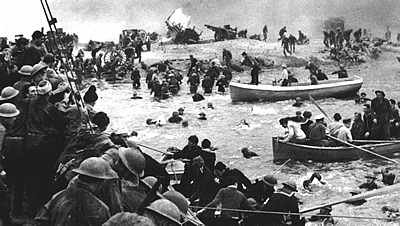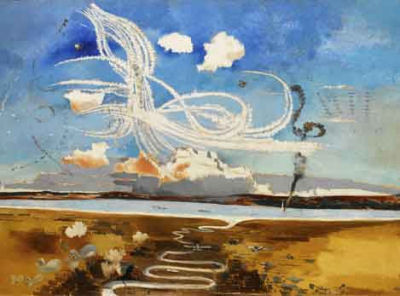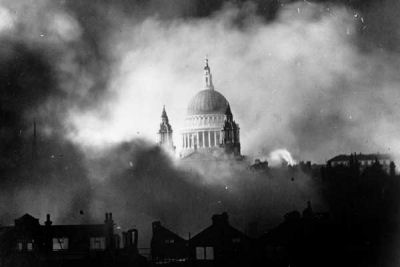
Battles involving England - Second World War


|
Battles involving England - Second World War |

|
|
Dunkirk evacuation 1940 Battle of Britain 1940 The Blitz 1940-1941 Battles of El Alamein 1942 Normandy Landings 1944 Burma Campaign Songs of the Second World War |
The Second World War was fought between the Allies and the Axis Powers. The major Axis powers were Germany, Japan, and Italy. The Allies included, at different times, Britain, France, Russia, the United States of America and China. The war involved the mobilisation of over 100 million military personnel, making it the most widespread war in history. Over seventy million people, the majority civilians, were killed. The two major areas of conflict were in Europe and North Africa, and in Asia and Pacific.
Adolf Hitler and the Nazis rose to power in Germany because of economic turmoil, fear of Communism and shame after the First World War. They invaded neighbouring countries, such as Austria and part of Czechoslovakia. At first this was tolerated by the rest of Europe, but eventually, after Germany invaded Poland, France and Britain declared war in 1939. Italy, a Fascist state under Mussolini, was an ally of Germany. Japan, another ally, bombed United States naval base at Pearl Harbor in 1941, which brought the United States into the war.
Dunkirk evacuation 1940 (location)The Germans advanced across France in a Blitzkrieg (German for "lightning war"). The British army in France was driven back to Dunkirk, on the coast of France. Large ships could not get close enough to pick up the troops, so small civilian boats from Britain sailed across the Channel to help ferry people to the large ships. These are known as the Little Ships of Dunkirk. Most of the British army was saved, but France fell. Winston Churchill was Prime Minister of Britain. Immediately after the Dunkirk evacuation, he said in the House of Commons "We shall go on to the end, we shall fight in France, we shall fight on the seas and oceans, we shall fight with growing confidence and growing strength in the air, we shall defend our Island, whatever the cost may be, we shall fight on the beaches, we shall fight on the landing grounds, we shall fight in the fields and in the streets, we shall fight in the hills; we shall never surrender." |
 Soldiers being rescued from the beach at Dunkirk, 1940 |
Battle of Britain 1940A few days later, in another speech in the House of Commons, Churchill said "What General Weygand called the Battle of France is over. I expect that the Battle of Britain is about to begin. Upon this battle depends the survival of Christian civilization. upon it depends our own British life and the long continuity of our institutions and our Empire. The whole fury and might of the enemy must very soon be turned on us now. Hitler knows that he will have to break us in this island or lose the war. If we can stand up to him, all Europe may be free and the life of the world may move forward into broad, sunlit uplands. But if we fail, then the whole world, including the United States, including all that we have known and cared for, will sink into the abyss of a new Dark Age, made more sinister, and perhaps more protracted, by the lights of perverted science. Let us therefore brace ourselves to our duties, and so bear ourselves that, if the British Empire and its Commonwealth last for a thousand years, men will say, 'This was their finest hour.'" Germany wanted to invade Britain, but first it needed to gain control of the air. The Battle of Britain was fought in the air between the British Royal Air Force (the RAF) and the German Luftwaffe. The Luftwaffe bombed ports and airfields but failed to gain air superiority. At the height of the Battle of Britain, Churchill said "The gratitude of every home in our Island, in our Empire, and indeed throughout the world, except in the abodes of the guilty, goes out to the British airmen who, undaunted by odds, unwearied in their constant challenge and mortal danger, are turning the tide of the World War by their prowess and by their devotion. Never in the field of human conflict was so much owed by so many to so few. All hearts go out to the fighter pilots, whose brilliant actions we see with our own eyes day after day; but we must never forget that all the time, night after night, month after month, our bomber squadrons travel far into Germany, find their targets in the darkness by the highest navigational skill, aim their attacks, often under the heaviest fire, often with serious loss, with deliberate careful discrimination, and inflict shattering blows upon the whole of the technical and war-making structure of the Nazi power." |
 Battle of Britain by Paul Nash, 1941 |
The Blitz 1940-1941The Blitz (German for "lightning") was the sustained bombing of Britain by Germany. German bombers attacked industrial areas and transport, but also bombed major city centres such as London in order to destroy British civilian and government morale. Wide-spread damage and deaths happened, but it failed in its aim. Britain, and later the United States, bombed Germany in return. Battles of El Alamein 1942 (location)The German Field Marshal Rommel was at first successful in North Africa, threatening the British Empire's control of the Suez Canal. At the Battles of El Alamein, the Allied troops under Montgomery beat the Germans. Churchill said "Now this is not the end. It is not even the beginning of the end. But it is, perhaps, the end of the beginning." He later wrote "Before Alamein we never had a victory. After Alamein, we never had a defeat." The Allies then invaded Italy. Germany tried to invade Russia but failed. |
 St Paul's Cathedral in the Blitz |
In 1944, Britain and the United States gathered together a large invasion force in Britain, and invaded France using the Normandy beaches. There was bitter fighting, but they gradually won their way across Europe and invaded Germany from the west. The Russians invaded Germany from the east. The Allies entered Berlin (location) in 1945, Hitler committed suicide and Germany surrended. VE day (Victory in Europe) was celebrated on May, 1945.
Singapore was a British colony. It thought to be impregnable but was captured by the Japanese in 1942. The Burma Campaign continued throughout the war. Since most of the attention in Britain was concentrated in Europe, this was sometimes called the Forgotten War. The Americans were fighting in the Pacific. In 1945, the United States dropped atomic bombs on Hiroshima and Nagasaki in Japan, and Japan surrended. VJ Day (Victory in Japan) was celebrated on August, 1945, and marked the official end of the war. Rationing in Britain continued until 1953.
White Cliffs of DoverBy Burton & Kent
I'll never forget the people I met Chorus
I may not be near But I have no fear Chorus |
Who do you think you are kidding, Mr Hitlerby Perry & Taverner
Who do you think you are kidding, Mr Hitler
Mr Brown goes off to town
So, watch out Mr Hitler
So, who do you think you are kidding, Mr Hitler We'll meet againby Charles & Parker
We'll meet again
Keep smiling through
We'll meet again |
Wikipedia (external site) for further information - Battles index